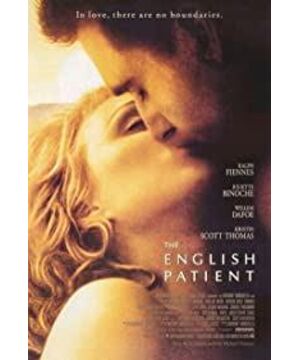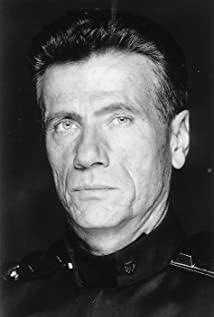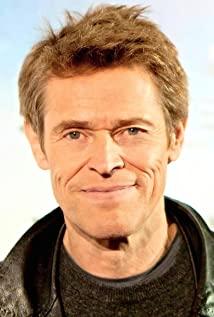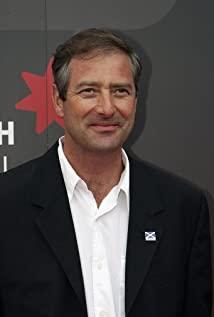================================= =======================================
The English Patient, Anthony Minghella, 9 entries Oscar, a classic. The splendid desert scenery and the beautiful and sad love story make many moviegoers unable to control themselves, and the focus of this article is on the content that makes the movie a secular myth-the establishment of the protagonist's justice and the sense of collectivism form of death.
The film uses constant flashbacks to interweave a story: in the 1920s and 1930s, Hungarian Count Elmasy and several other members of the Royal Geographical Society lived in the desert to explore Africa, the beautiful Catherine and her husband. Jeffrey joined them halfway through. Elmasy and Catherine are having an affair and are discovered by Jeffrey. Jeffrey wanted everyone to die, but only completed suicide and wounded Catherine. Elmasy helped the Germans march into Cairo to save Catherine, but Catherine died and was severely burned herself. He sealed up this past, and as a British patient, he was rolled around with the medical team. Nurse Hannah couldn't bear to see the dying man suffer by boat and car, so she took care of him in an abandoned monastery alone. Here Hannah meets her favorite Indian sapper jeep, as well as the former spy who came to seek revenge on Elmasy. The war is coming to an end, and Elmasy has also opened up his own history. After completing the memory, he will soon be destroyed.
The narrative structure of the film is flashback, but unlike the traditional flashback as a supplementary explanation of meaning and motivation, the flashback of this film not only brings out a double line that does not overlap in time but is fully intertwined in meaning. The narrative further establishes the core position of memory as an independent storyline on the double line. Judging from the number of independent semantic segments and the length of time (refer to the arrangement of semantic segments in the appendix), the proportion of recalling clues is basically equal to that of the actual clues in the film. However, it is undeniable that the story in memory Context gives the audience a stronger impact, both visually and emotionally, because of its ups and downs of tragicomedy and well-defined love and hatred. Therefore, this stronger imprint brings about the magnification of time in psychology, so the daily reality story in a certain sense becomes the connection or embellishment of the story in the memory. At the same time, not only the strength of the plot itself, but also the more human image (not just visually) of the hero Elmasy in the memory further strengthens the appeal of the past line.
If desire is an intrinsic attribute of human beings, then the male protagonist in this film has completed such a process: he changed from a human to a zombie and became immortal, but then changed back from a zombie to a human to meet his final destruction. Although Elmasy in the film has been shown in a weak and seemingly dying image after being burned, the plot brings a contrary suggestion: he is immortal in this state. From the crash in 1941 to the end of the war in 1945, such a person who was on the brink of death completed four years of wartime survival. As a critically ill patient who was transported in the car and experienced great pain, he was continuously transferred over a period of 4 years, and even transported from Africa to Italy. It has to be said that his survival is a service for the plot and expression The miracle, and the meaning of this miracle is very simple: "Only the living can be killed, and desires and feelings are the proof that you are alive", just like the expression of the male protagonist in semantic paragraph 51. In this way, the male protagonist's history of entanglement with desire, love, possession and morality has become the focus of attention in the film as a symbol that marks his existence as a person.
As evidence, we can use water as an important metaphor when talking about desire. Rogi Muunier once wrote: "In real cinema, the waves are always used to conjure up violence or lust." The use of the desert as a vast backdrop in the memory thread, its water-deprived environment suggests a kind of The suppression of desire is like the male protagonist who has no family and explores the desert alone. However, when the male protagonist and Catherine flew the planes around each other in the air, the originally static desert with suppressed desires turned into a sandy sea flowing like waves, thus predicting the explosion of desires at the camera level. At the same time, in Semantic Segment 33, Elmasy and Catherine take a bath together, which also uses water as a medium to highlight their lust.
Returning to the discussion of the plot, the memory as an independent narrative thread tells the inevitable tragedy of an attempt to transcend moral norms with love. However, the deviation of the hero and heroine in the plot and the social norms did not prevent the film from being fair to them. shape.
The identities of hero and heroine give them full possibilities to become positive characters. Elmasy was a Hungarian count, proficient in many languages and knowledgeable. On the other hand, the film builds an unobtrusive line through his communication with the locals (semantic paragraph 12), his aversion to possession (semantic paragraph 33), and his decision to give up his luxurious life to study the desert The protective mechanism of the film makes the antipathy that a European earl may trigger - such as class racial awareness and hedonism, etc. - all of which have nothing to do with the exotic earl in the vast African desert. Also, in the movie, the identity of Elmasy as a spy in the original book was changed, so that the incident of exchanging maps between him and the German army completely became the proof of great love, and further maintained the positive image of the male protagonist. As soon as Catherine appeared on the stage, she showed the light of the coexistence of wisdom and beauty of intellectual women. The calm aura exuded from her body made her husband who always told jokes but was on pins and needles dwarfed her, so that Catherine's later affair seemed so natural. People are pleased. What's more valuable is that Catherine still asks Elmasy to bury her husband when she is about to die (semantic paragraph 50). A love that conforms to social norms, but is profound, timeless and moving, lays a solid foundation.
On the other hand, although it was not stated clearly, the camera gave enough justice to the love between the two and absolved the two of them for their cheating. The most notable scene comes from the part where everyone is telling a story around a campfire (semantic paragraph 16), where Catherine tells the story of the queen who sees Gus hiding in the shadows, and an over-the-shoulder shot that puts Elmasy's back in the shadows. In the shadows, the correspondence between the film and the story endows it with a fatalistic rationality, as if it should be as it should be. There is also a very obvious passage in which Jeffrey got up to go to Cairo (semantic paragraph 24). When he walked to the plane, the relationship between the three people in the camera was very subtle: First, Elmasy watched Jeffrey get on the plane, and then looked at the camera. Elmasy, the change of the focal length of the lens leads the viewpoint to Catherine in the distance, Elmasy turns back, and then cuts to Catherine looking at Elmasy who is staring at him and Jeffrey who seems to be off-screen. The language of the camera is about to come out. The love of the hero and heroine is the real love that transcends the world. Jeffrey can't even form a stable triangle relationship between the two. This love is so devastating that Jeffrey can only Turn a blind eye and pretend to be ignorant.
The justice on the lens comes not only from the characters and the picture itself, but also from the replacement of concepts and the perspective of anti-utilitarianism in the narrative strategy. Really clever lies do not use seamless logic to weave an answer, but naturally make people forget the questions that have been asked. Therefore, really clever lies do not lie. In Semantic Paragraph 41, Elmasy is very disdainful of the statement put forward by his companion, "Occupying the desert is equal to occupying North Africa." He sarcastically repeated "Occupying the desert". Let the replacement be done for the topic itself. If we want to discuss whether it is just for the hero to give the map to the Germans, the hero avoids giving a yes or no answer. The male protagonist's disdain for the term "possession" itself expresses the impossibility of possession itself, and also denies the question of whether possession is just. In this way, justice, which is usually very sensitive in the context of war, is successfully replaced by possibility. On the other hand, when Elmasy was asked by David about the possibility of many people dying, his answer was: "Many people have died, just of different nationalities." (Semantic paragraph 47) The meaning is that the state is a false identity, let alone those who die under the name of the state? This answer denies the state and utilitarianism, but also negates the justice of any war, thereby further eliminating the moral pressure that the audience may bring about accepting the male protagonist's collusion with the enemy.
With the righteousness of the protagonists established, the film brings us a vision that deconstructs collective concepts and values. World War II is blurred into the confrontation between the Allies and the Germans in this film, and we don't even need a specific name to bring the plot into any war. Although the war has brought irreparable wounds to the various actors in the film, the wounds are not in any way specific to the war itself. Rather, the abstraction of war provides an identity tension that becomes the immediate trigger for tragedies of all kinds. Therefore, this film is not so much a film against war as it is a film against identity, especially the identity that the collective imposes on the individual. The male protagonist has more than once opposed the so-called division of identities and the concept of possession. If this concept is reiterated in the context of the end of the 20th century, what he opposes is the mutual possession of the collective and the individual, what he opposes is the camp, he opposes What is lost is the individual's disorientation in collective meaningless striving to possess.
===================================================== =====================
Appendix:
Semantic Paragraph Arrangement: Memory Paragraph Realistic Paragraph
1. K draws a villain on paper, and the shadow of the villain becomes an airplane on a dune shadow, then the aircraft was hit, fire, flames fades
background music: Arab Girl, Camel, finally weakened, and the main theme of integration
2. Hanna, wounded soldiers joke, into the operating room atmosphere darkened
3. desert, wreckage, Arabs, saw his book, was towed away, the veil of sunlight
4. barracks, Hannah and Jen, blood donation, Hannah chance that her lover is dead (ask hesitation before Captain -> no news That's good news)
Background: Artillery fire
5. The Arab magician treats the male
protagonist, one eye opened in the blood 6. Italy 1944.10 Ocean waves, the male protagonist was questioned, the male protagonist claimed to have amnesia, life was meaningless, and lied that he was married , British
7. the medical team, the male appeared to be very painful, Jen Hanna to find money to buy scarves, then killed (minor fast-paced start until Hannah was stopped)
8. start mine clearance, Chinese Na rushed over again, and then got Jen's relic under the protection of the British
guy. 9. Hannah intends to keep the male lead, narrates the curse theory to the male lead, and finds the garden (minor music variation, looking for the theme), in the collapsed Patrol in the pavilion
10. Hannah was just asking to stay, but the sergeant couldn't do anything about her, so he placed the male lead on the bed, everyone retreated, the male lead sang faintly on the bed, Hannah cut her hair in her underwear, and repaired the steps with a book (-> Housewife), leads to books, leads to Herodotus, and contrasts with plums in the garden (deep contrast: emotional desire and love vs rational human civilization)
11. Hannah takes a bath, the male protagonist tries to pick up the book, the book falls, Sprinkle all kinds of paper, enter the meaning of memory
12. The male protagonist asked the prophet for advice on the cave, the balance was broken by the sound of the plane in the distance, and the female back mountain was mentioned. Yellow plane, couple K, male protagonist watching from a distance, everyone meeting, discussing about adjectives in the desert (male protagonist: adjectives are irrelevant, cuckold man is funny, K: love needs adjectives)
13. The male protagonist and Maduo prepare the plane, Two planes flirting with each other, in fact two pilots flirting with each other (6/8 long melody, romantic and empty theme)
14. Hannah asked the male protagonist to watch the scenery, the male protagonist felt that there was a sand, and asked why he wanted to save him, Hannah Na answered that she was a nurse
15. In the evening, Hannah danced the square (the theme of loneliness in music, and gradually added percussion to the next scene)
16. Everyone performed a show (a certain male opera, the cuckold man was funny, it was K’s turn)
17. Han Na and K cross-read the text of the power grab, (mysterious music theme, and weird bird
calls ) 18. Hannah drives away the crow, meets Eight Fingers, and Eight Fingers gives two eggs, calling herself a fellow countryman and explaining why she is a thief The intention is to stay for a while. Hannah thought Mary sent him to watch over her.
19. The male protagonist was unhappy with the arrival of the Eight Fingers, opposed the idea that nationality was important in wartime, confronted the Eight Fingers head-on, and mentioned the male protagonist's name when discussing the trauma of the war
20. (Mystery theme music) The market, to buy the price of cloth K and M main dispute
21. (jazz background) bar, the crowd discuss new journey tariff issues, talking about absent / present / future wives, the male slightly gloomy, people dancing and K, green hat male unhappy, male The Lord talks to K about the market, and the two are dazzled by the music.
22. (Dance hall music fades out) Hannah lies on the male lead, wakes up, washes her hair, and Eight Fingers comes in, telling Hannah that the male lead is not as holy as she imagined, and the tragedy of Eight Fingers is because of him, Hannah Refuse to accept
I'm not in love with him; I'm in love with ghosts. So is he; he is in love with ghosts.
23. At night, next to the bonfire, the man in the green hat is about to leave, and the man in the green hat continues to
laugh The man gets on the plane, turns his head, K in the distance, cuts to each other, K's back and the male protagonist who is looking at her, and the man in the green hat who is embellished in the picture)
25. (Piano sound comes first in the painting) Hannah plays and finds it The piano, the sound of the piano is getting farther, the picture is cut into eight fingers. The male protagonist is injecting morphine, the long view, the hands, the camera is up and down, the man in the hood appears from the break, the gun is fired, and the landmine is found in the house, Hannah because he is against her The unresponsiveness of Bach's jokes is very funny
26. Hannah tells the male protagonist that he likes Indian men, and the male protagonist is against the Indian man living around him
27. The Indian man rides away, Hannah is in the hanging mirror fragments Seeing himself, the male protagonist struggled to sing, (singing beyond the screen, turning to memories)
28. Desert Racing, K and the male protagonist, the male protagonist didn't want to speak, and later mentioned singing, K sang with the natives, (Transitioning with indigenous singing), during the worship of the local guide, the male protagonist found the legendary cave. The walls were full of villains. K painted the villains
. The card is given to the male protagonist, but the male protagonist refuses. K hints that the male protagonist should just let the flow take its course.
30. At night, when the wind blows and the two flirt in the car, K writes P on the car window, and fades out of the male protagonist's face on the hospital bed.
31 . (mysterious and dangerous theme) desert, two people see a car in the distance, signal flare for help, male protagonist asks for painting, two people rescue another car, K finds male protagonist's note about her, at night, another flare, K explained that the cuckolds were actually British government spies, Maduo found them, K asked her if she was K (a clarinet, transition)
32. The Indian man and the protagonist talked about Kipling's novel, Hannah entered, and the three made fun of each other
33. (Car horn prompts) Cairo, the male protagonist watched K enter the hotel, and the male protagonist drew a clear line. In the male protagonist's room, the remorseful male protagonist on the bed and the pure white K outside the door are full of lust like a tide. Take a bath together, (feminine liberation about sewing, male protagonist hate: own somebody, being owned)
34. (sound before painting) Discuss the photos and paper in the book, Christmas firecracker paper, and finally say K's name
35. During the Christmas dinner, the two could not get out of their lust. K pretends to be dizzy, and shakes the shadow (climax music) behind the male protagonist OOXX, the Scottish bagpipe in the house. The cuckold found K, who did not respond to his teasing.
36. Eight-fingered asked the male, the male desire to die before the rain, by the "paper marriage" jump
37. green hat man surprise to K, K, and found the male affair, the male to put Hungary K ballads, jokes, the male claiming The notch on the K's ridge is its own. The male
protagonist in the bazaar once again used the "yes, yes, absolutely" used in the desert (music transition) 38. Eight-finger record, discussion about singing (jazz piano continued until the time jump), Hannah gave the Indian male Send olive oil, the male protagonist asks about the past of Bazhi.
39. 1942.6, Tobruk, the chaotic background of the war, the dialogue between Bazhi and a man confessed that the man gave the map to the German army, so the German army marched into Cairo. Eight fingers were caught, and one finger was cut off during the interrogation.
40. Eight Fingers implied that he was here to kill the male protagonist, because the male protagonist led German troops into Cairo.
41. Cairo, 1939.3, Mardo and the male protagonist had a dispute over the map. The male protagonist was very disdainful of the idea of own the desert, and asked Mardo what the name of the woman's throat was.
42. In the movie theater, about the title of the war, K said that he could not continue betraying her husband, and K turned and left.
43. (The background music of the movie continued, and then it was integrated into the next scene) The male protagonist was thinking on the bed, with eight fingers under the bed.
44. The main row male party, said it could not be relieved K to
45. (dance music continued into the male in bed weak) Hannah out of the main room are attracted men found Indian men (romantic theme music) conch lights, India Male Take Hannah to visit the church, very romantic (romance theme music reproduction). The two spent the night together. In the morning, the Indian man was called to defuse the bomb, which was very dangerous. But the tension was relieved by the news of Germany's surrender and the arrival of Hannah. (dance music)
46. Hannah appeared in front of the male protagonist and found some people to take the male protagonist for a run in the rain. In the ensuing celebration, the subordinate of the Indian man was bombed to death. The Indian man saw that the fiancee of the subordinate could not let go, and was determined to keep Hannah out.
47. Before the Eight Fingers go, retell the old story with the male lead, pointing out that the male lead let the German army march into Cairo, and Mardo committed suicide in shame.
48. Before Ma Duo left, he emphasized the importance of nationality to the male protagonist.
49. (The theme of sunset music) The male protagonist told about the death of K.
50. As K walked to the cave, K confessed (the music extended to the theme of tragedy), the male protagonist left K in the cave and walked out of the desert alone, and had a dispute with the British soldiers, and was later imprisoned as a German, the male protagonist murdered and jumped out of the car.
51 . The weak male protagonist continued to describe how to give the map to the German army and then returned to the cave to pick up K. Eight fingers said that the poison was ineffective against the male protagonist, and he could not kill him yet.
52. India and Hannah recall Hardy men were killed
53. recalls, (tragic music) main male dressed in German uniforms back to the cave and see the K
54. The men should tell Hannah he was dying, Hannah and India The male said goodbye, the male protagonist begged Hannah to die, Hannah was very painful but still agreed to the male protagonist. Hannah reads the text left by the male protagonist K (flashback, interweaving K's voice, weak music)
55. The male protagonist is no longer there, only a copy of Herodotus' "History" remains. Hannah leaves (theme music), the plane in the desert, through the intermittent shadows of the woods, the final picture is a sun.
View more about The English Patient reviews











